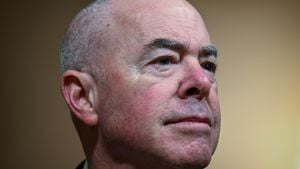A significant raid carried out by federal investigators last week at the Mayflower Hotel in Long Island City has unearthed connections between the hotel’s owner, Weihong Hu, and several influential figures within the administration of New York City Mayor Eric Adams. This operation has raised numerous questions about potential improprieties linked to campaign fundraising and the city’s approach to transitional housing for ex-inmates.
The Mayflower Hotel, currently functioning as a transitional home for recently released inmates, has garnered attention not only for its animal residents but also due to its owner’s ties with high-ranking officials, particularly Winnie Greco, who previously served as one of Mayor Adams’ most trusted aides. The search warrant executed on the morning of Thursday, November 14, came from the U.S. Attorney for the Eastern District of New York, Breon Peace.
While it remains uncertain what specific evidence the feds were after, sources familiar with the investigation indicate it might encompass broader inquiries related to fundraising practices by Adams’ staff, especially concerning illegal contributions. Housing Works, the nonprofit organization managing the shelter program at the hotel, made it clear through spokesperson Simbi Akiolu, "Housing Works was not the target of the action by federal authorities – nor were any of the clients Housing Works serves at this site, agency management, or any subsidiaries."
Historical reports indicate this hotel has acted as more than just housing for former inmates; it has also been the platform for fundraising events involving Adams. During his 2021 campaign, Hu was active in hosting fundraisers where thousands of dollars were raised to support the candidate. Despite the apparent collusion, Mayor Adams himself has not publicly commented on this raid or its ramifications.
Hu is not new to scrutiny. Read previous articles where it's documented how funds may have been traced back to him under suspicious circumstances, particularly concerning reimbursable donations from family members to Adams. These reports pointed to more dubious activities as multiple stakeholders claimed heavy contributions made were returned to donors not only through cash but also potentially through the rental agreements established via government contracts.
Legal troubles continued to loom over this situation, particularly following Greco’s recent resignation from her role within City Hall—her decision coming mere weeks after her residence was also raided by federal authorities as part of separate legal inquiries. According to reports, there is speculation her departure and subsequent inspections are tightly interwoven, raising issues about both her and Hu’s operations.
Adams, who has faced his own set of challenges since being indicted last September for what authorities allege were illegal straw donations for his campaign, continues to maintain his innocence. His trial is slated for April next year, placing his entire administration under the microscope during this turbulent period.
The growing web of allegations not only includes the direct relationships between Hu and Adams but also highlights the dysfunctional aspects of New York City’s political ecosystem where patronage and questionable contract awards have raised eyebrows, sparking investigations from various governmental and independent entities. With multiple inquiries about campaign finance and the operational integrity of transitional housing programs, concerns about the viability of these establishments become more pressing.
The backdrop of this situation raises additional issues concerning how these types of organizations are funded and operated within urban environments—setting the stage for debates around ethical governance, financial accountability, and social justice.
Despite calls for transparency, the full picture remains murky as the investigations solidify their findings. They will undoubtedly play out throughout the coming months as stakeholders—both political and civic—await the findings. With each avenue explored, the possibility of broader reforms may emerge from the chaos, but the overall sentiment is woven with skepticism and distrust, particularly against the backdrop of what many see as systemic failures.
It’s worth noting how this saga encapsulates the challenges Brazil’s democracy faces today, where corruption and mismanagement touch every layer of governance. The fallout of these investigations will likely cascade down the hierarchy, possibly implicate others within Adams’ circle, and offer citizens much-needed insight as they discern who truly has their interests at heart.
While the raids and allegations are still under investigation, the scrutiny of how city officials maintain their campaign finance and operational integrity has never been clearer. And as this investigation continues to develop, residents and stakeholders alike remain vigilant, awaiting factual clarity about the processes they inadvertently support through their taxes and services.



